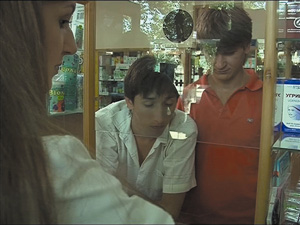NGOs Educate Teens on Family Planning Through Film, Theatre
Teenagers are notoriously tough to please. Reaching out to them with any important information, particularly regarding reproductive health and family planning, can be very challenging. With grants from USAID’s Together for Health project, two Kharkiv, Ukraine NGOs—STEL and Family from A to Z—have created engaging, informative media programs around these sensitive issues that appeal to young audiences.
Valentina Chichkun, a TV producer, had long been involved in documentary production on social issues. With the birth of her daughter in 1995, she decided to create a new program on parenting to share her experiences with other new parents—and the concept for the first Family from A to Z project was born. Gradually, the project expanded and became an NGO which ran parenting classes, generated literature about family issues, and produced a series of television programs about social issues—all completely underwritten by a for-profit television studio. After winning a USAID grant in May 2007, the organization focused its efforts on reproductive health and family planning, and produced a short film, “Plan Your Future.”
The team of writers and producers worked hard to create an upbeat, modern story to which teenagers would be able to relate, while tackling adolescent sexuality and psychology. Local students were invited to act in the film, which follows a young couple as they fall in love and deal with sexuality issues. The protagonists read magazine articles and ask their friends about contraceptive options. In following the onscreen couple, the audience learns about different contraceptive methods, which are illustrated with imaginative animation and explained by psychologists and gynecologists.
Family from A to Z strongly believes that the program conveys messages about issues that are difficult to discuss, and is made more effective due to the popularity of television among Ukrainian teens. Natalia Malikova, the director of the project, explains, “Teenagers are usually uncomfortable discussing sexuality with their parents or even with doctors. The film gives them the information they need in a format they can relate to.” She hopes that after watching the film young people will feel a little more comfortable discussing such issues with their friends, partners, and families.
After three months of production, the film is now ready for distribution, and Family from A to Z has been working actively with the Kharkiv City Department of Education, local school principals, and a team of university student volunteers to show the film in health education classes at secondary schools throughout Kharkiv. So far, 35 principals have asked for the film to be shown in their schools, and Family from A to Z has recruited Together for Health-trained educators and school psychologists to lead post-screening discussions about adolescent sexuality with the students. The film will air on 26 TV channels, including Kharkiv Oblast TV and national channels and will be distributed for use by educators, NGOs and schools throughout Ukraine.
A similar philosophy lies behind the NGO STEL’s production, On the Other Side of Love, a theatrical piece about sexual health and decision making. Written by Ukrainian playwright Neda Nezhdana and directed and produced by actor Sergei Berezhko, the play showcases a group of five students from the STEL student theater cooperative of the Taras Shevchenko National Ukrainian Theater in Kharkiv. Having produced plays about a variety of social issues in the past—from drug addiction to academic honesty—the students were ready to tackle the issue of reproductive decision making when they received a USAID Together for Health grant last May.
 |
A pharmacist discusses contraceptive options with two young people, played by actors (from left) Halina Huhnina, Maksym Sterlik, and Evgeniy Morhun in the film “Plan Your Future.”
Photo Credit: Still from the film by Lidiya Hryva |
Created to appeal to adolescents aged 15 through 17, the play follows four couples: a 20-year-old couple; a 15-year-old couple; a 20-year-old woman and a 30-year-old married man; and, a film director and a young actress. The audience watches each couple navigate issues pertaining to contraception, communication, and healthy relationships. The young actors themselves attest to the importance of the subject matter. “I have friends who have been in this situation,” remarked one actor. “It definitely happens.”
The play has been performed in eight schools around Kharkiv since its September 2007 debut and was booked through the end of May 2008. The actors performed the piece in November for a special commission from the Kharkiv City Department of Education, which recommended it be shown in Kharkiv schools as a contemporary, informative way to teach youth about family planning.
The 50-minute piece is designed to be broken into segments so that a school psychologist can discuss with students technical information about family planning and reproductive health throughout the performance. Afterwards, the audience participates in discussions with psychologists, Together for Health-trained educators, and the actors. Berezhko describes the audiences as very responsive, and he reports that after a few minutes even the teachers are drawn into the “open, democratic atmosphere” of the play and the discussions.
It is this democratic atmosphere that Berezhko and the student actors value about the medium of theater. Their hope is that students will identify with the characters and that the dramatic presentation will literally set the stage for open discussion about family planning and reproductive health.
Back to Top ^ |


